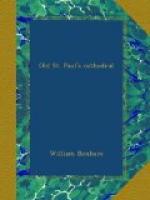The Bishop of Rochester was, of course, Fisher. He was both learned and pious. Burnet says he strongly disliked Wolsey, because of the latter’s notoriously immoral life. Fisher, though in his unflinching conservatism he regarded the proceedings of Luther with hostility, was anxious, as were More and Erasmus and Colet, for reformation on Catholic lines. He, like them, favoured the new learning, and even declared that the Continental reformers had brought much light to bear upon religion. But he opposed the King’s divorce, and refused to acknowledge his supremacy over the Church, and was beheaded on Tower Hill, June 22nd, 1535. There was no act of Henry which more thoroughly excited popular horror.
When Charles V. came to England, in 1522, Wolsey again said Mass at St. Paul’s, with twenty bishops to cense him. It was on this occasion that he changed the meeting-place of Convocation from St. Paul’s to Westminster, that it might be near his own house. Skelton, the poet, who hated Wolsey, thereupon wrote the following distich:—
“Gentle Paul, lay down thy sword,
For Peter, of Westminster, hath shaven
thy beard.”
In 1524, Francis I. was taken prisoner at the battle of Pavia, whereupon the sympathy of England for his successful rival was shown by a huge bonfire in front of St. Paul’s, and the distribution of many hogsheads of claret. On the Sunday following, Wolsey sang Mass, and the King and Queen, with both Houses of Parliament, were present. Once more (Shrove Tuesday, 1527) the great Cardinal came in dignity; it was to denounce the translation of the Bible and to condemn the Lutherans. Certain “heretics” were marched through the cathedral in penitential dresses, and carrying faggots, which they threw into the fire by the great rood at the north door, in which Testaments and Lutheran tracts were also burned. On this occasion, also, Fisher preached the sermon. A few years later (1530), there was a similar holocaust, at which the Bishop (Stokesley) presided.
But now came an event of momentous importance. Wolsey fell into disgrace with the King, and, after some preliminary attacks, was charged with high treason. From trial on this charge he was delivered by death (November 28th, 1530). But he had brought the clergy unwittingly into trouble. The law of Praemunire forbade a man to accept the office of papal legate in England, or the clergy to recognise him. Wolsey had obtained a patent under the Great Seal to exercise legatine authority, and for fifteen years no objection had been taken. When he was indicted for the infringement of the law, he refused to plead royal permission, fearing to incur yet greater displeasure of the King. So judgment went by default. And now the clergy were likewise impeached. They met in St. Paul’s Chapter House, and in their terror offered L100,000 fine, under the advice of the Bishop. The King refused to accept this unless they recognised him as “supreme head of the




